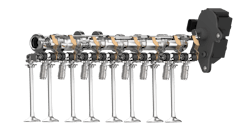The rapid pace of advancing vehicle technology will create a vastly different mobile environment for drivers in the next seven years. The year 2020 may seem a long way off, but in the world of automotive development it's right around the corner. The average car is redesigned every seven years, so while 2013 models are just hitting showrooms, the 2020s are already on the drawing boards of secluded automotive design facilities across the globe.
Want more technology news? Sign up to receive our new Aftermarket IT newsletter. Click here!
Far more intriguing than the futuristic shapes posted on the conference room walls and computer monitors at these facilities is the level of advanced technology found under the skin of 2020 model year cars and trucks.
Following is the list of Top 10 Future Car Technologies for model year 2020, with comments from Karl Brauer, Editor-In-Chief, Total Car Score:
- Super Fuel Efficiency – "Current EPA guidelines require the average new car to achieve 50-plus mpg by 2025. Even if those standards are reduced it's clear fuel efficiency will remain an integral part of future vehicle design. Smaller engines that provide both strong acceleration and 50-plus mpg will be the norm," said Brauer.
- Media on Demand – "The concept of having access to Internet radio stations is novel in 2013, but the cars of 2020 will have on-demand access to every form of online news and entertainment. A potentially dangerous distraction to future drivers? Not if they don't have to worry about driving (see #4)," said Brauer.
- Voice Control – "Much like the space travelers we've watched in every Star Trek series since 1966, all cars in 2020 will feature fully functional voice recognition. Talking to your car will be as easy as talking to your passengers, with no vocabulary limits or a need to speak slowly to avoid command errors," said Brauer.
- Driverless Cars – "'Drivers' won't always have to drive in 2020, because cars won't require driver input to stay in their lanes, slow for traffic congestion or stop to avoid an accident. Much of this technology already exists and is being used by companies (like Google) to cut driver fatigue and reduce accidents," said Brauer.
- Self-Aware Cars– "Is that stop light ahead red or green? What's the speed limit on this stretch of road? Did an accident and subsequent traffic jam just occur around the next bend in the freeway? Your car will know the answer to these and other questions before you do, and will update its route accordingly," said Brauer.
- Social Goes Mobile – "Today's latest in-car communication and social media features, such as texting or tweeting, will give way to reading and responding to email, participating in group calls and 'attending' online parties. Want to watch the NBA finals 'with' your friends as you commute home? You will," said Brauer.
- In-Car Office – "Connection technology will also allow for enhanced in-car productivity. Writing reports, or dictating them through voice recognition, receiving and reviewing documents, participating in video conference calls and managing a team – from the driver's seat – will be standard protocol in 2020," said Brauer.
- Lightweight Materials – "Driven by the need to reduce fuel consumption, future vehicles will use lightweight materials, such as high tensile steel and advanced plastic composites, including an expanded use of carbon fiber, to reduce weight without sacrificing structural integrity or passenger safety," said Brauer.
- Zero Maintenance – "Vehicle maintenance requirements have been reduced in recent years, with transmission fluids and engine coolants designed to last 'the life of the vehicle.' By 2020 cars will have very few parts or systems that require service more than once every 100,000 miles – if ever," said Brauer.
-
Hybrid Technology – "Like fuel injection over the past 30 years, hybrid technology will transition from rare and exotic to common and fundamental in new car design. By 2020, the concepts of letting brake energy go up in heat, or an engine idle while stopped in traffic, will seem wasteful because new cars won't," said Brauer.
Subscribe to Aftermarket Business World and receive articles like this every month….absolutely free. Click here.


